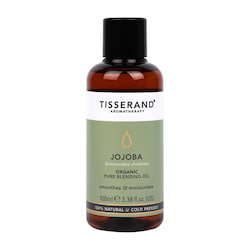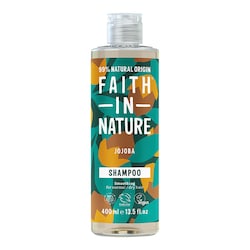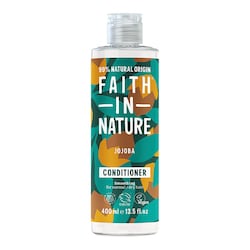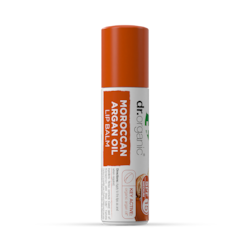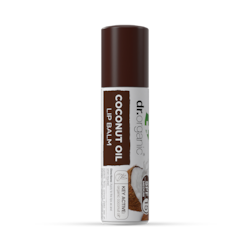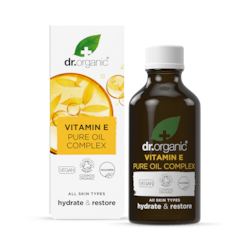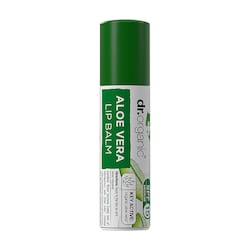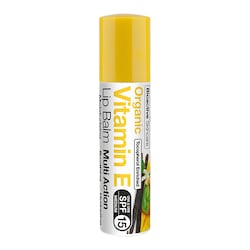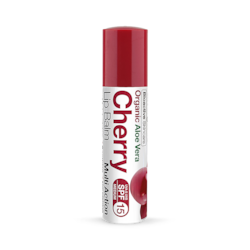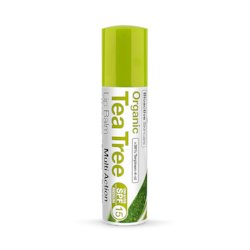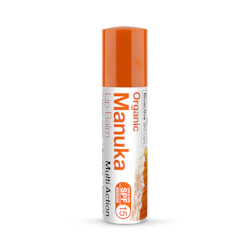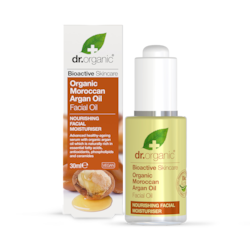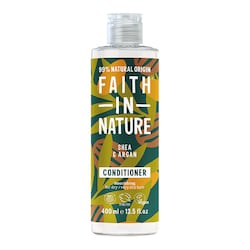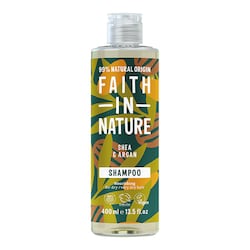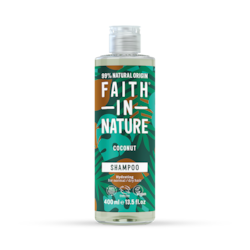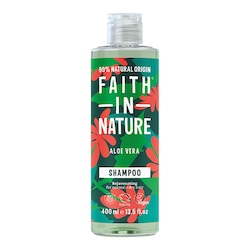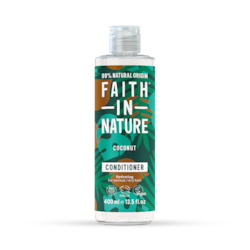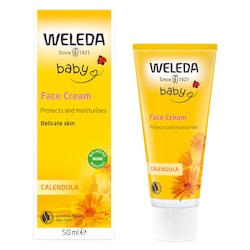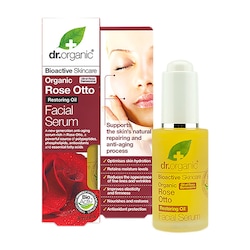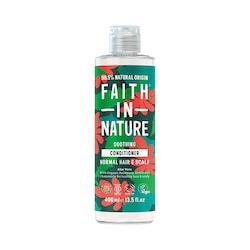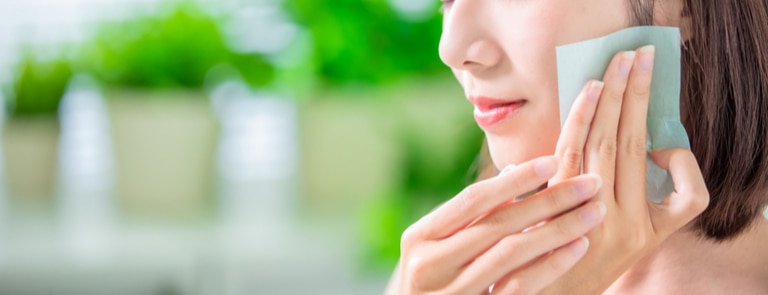20% off £30
What's great about jojoba oil?
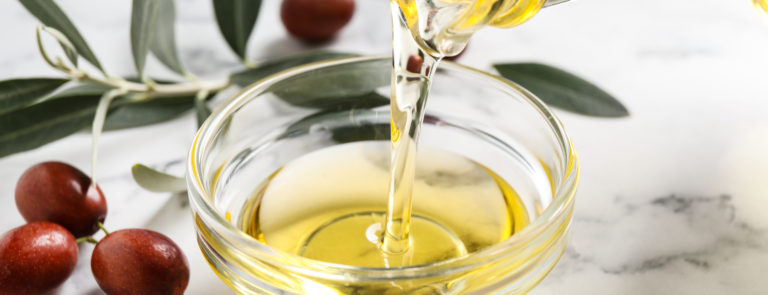
You may have seen it in your beauty products, such as a moisturiser or face mask, but why is jojoba oil so good for our skin?
What is jojoba oil and what does it do?
Jojoba oil, which is actually more of a wax (54% wax) than a liquid, is extracted from the seeds of the jojoba bush or Simmondsia chinensis, native to desert regions of northern America.1,2,3
If you store jojoba oil in a cold place, you’ll see it looks cloudy and gets thicker.
This is due to the fact jojoba oil is a wax that becomes liquid at room temperature.
When stored in a colder temperature, the fattier elements start to solidify and separate out.4
Traditionally, jojoba oil was used as a herbal remedy for indigestion and wound-healing.6
Nowadays, the oil is often used:6
- In cosmetics, for example, sunscreens and moisturisers
- To relieve dry skin
- As a treatment to nourish and strengthen hair strands
Jojoba oil is available on its own or combined with other oils, or you might find it as an ingredient in a skincare product, such as in a cream, face mask or body scrub.
Jojoba oil for hair is as popular for jojoba oil for skin. It’s a real all-round product and can be found in hair conditioners, as well as nail and cuticle products.7
How is jojoba oil made?
It’s usually made by a method known as cold pressing.
- The hard, pod-like brown seeds are poured into an expeller or seed press.
- The oil is then extracted and the exterior, which contains a substance called Simmondsin that can be toxic if consumed, is disposed of.
- The jojoba oil liquid’s poured into glass containers with airtight lids and is ready to use for an indefinite period of time.
Cold-pressed organic jojoba oil is reported to be the best jojoba oil because it’s unrefined.8
When it comes to storing jojoba oil, it’s best to keep it in a dark, cool place although, unlike other cosmetic oils, it doesn’t become rancid because it doesn’t contain any triglycerides.9,10
How can you tell if jojoba oil is pure?
When shopping for jojoba oil, it's best to look out for products that are the most natural or pure.
Good quality jojoba oil is golden in colour, free from impurities and clear.
These three factors are usually a good indication that the jojoba oil product is unrefined and exists in its natural form.
Jojoba oil benefits: What is jojoba oil good for?
Researchers looking into the effects of jojoba oil on the skin have suggested it may have the following effects:11
- Moisturising
- Skin-soothing
- Hydrating
Jojoba’s renowned for its rejuvenating properties.
It’s also an incredibly versatile oil that’s suitable for all skin types and sinks into the skin quickly, making it feel soft and supple.12
-
It’s moisturising
Jojoba oil for skin has amazing moisturising properties due to the fact its pH level is nearly identical to that of the natural moisturiser, sebum, that’s produced by human skin.
This makes it incredibly soothing for human skin.13
-
It may promote wound repair
Jojoba oil contains Vitamin E, which is an antioxidant.
As a result, it can help prevent damage from free radicals and boost overall complexion.
It also works by preventing the oxidisation of substances, such as oil that can clog the pores, on the skin.14
A 2011 Italian laboratory study on human cells found jojoba oil may promote wound repair, for example by speeding up collagen synthesis, although more research is needed in this area.15
-
It balances skin oil
Because jojoba oil’s so similar to the skin’s natural moisturiser, sebum, the skin thinks it’s adequately moisturised when applied.
In turn, this can help balance out the natural levels of sebum.16
What’s more, it’s also non-comedogenic, which means it won’t block pores.17
-
It reduces the appearance of wrinkles
Because it’s such an excellent moisturiser, and keeping skin moisturised can help to fade the appearance of some wrinkles and fine lines.
Jojoba oil’s also said to help improve skin suppleness too.18
Dosage: How much jojoba oil is safe to use?
Jojoba oil should never be swallowed or taken internally, but when applied to the skin, it is safe to use regularly.19 Always read the label for dosage instructions.
Talk to your doctor or dermatologist before using jojoba oil if you are pregnant; no studies have looked at using jojoba oil during pregnancy.
Children should avoid using it for the same reason.
Side effects: What are the side effects of using jojoba oil?
Side effects are rare, but can include a skin rash.20
Less often, you can experience a more severe allergic reaction, for example, hives and facial swelling. Seek emergency medical help if this happens to you.21
Last updated: 19 August 2021
- https://www.leaf.tv/articles/how-to-make-jojoba-oil/
- https://www.medicalnewstoday.com/articles/321665
- https://www.sandiego.edu/cas/biology/kumeyaay-garden/plants/jojoba.php
- https://www.aromantic.co.uk/products/organic-jojoba-oil
- https://www.sandiego.edu/cas/biology/kumeyaay-garden/plants/jojoba.php
- https://www.ncbi.nlm.nih.gov/pmc/articles/PMC5796020/
- https://www.airlifebetter.com/best-jojoba-oil-brands/
- https://www.cliganic.com/blogs/the-essentials/jojoba-oil-benefits-and-uses
- https://www.leaf.tv/articles/how-to-make-jojoba-oil/
- https://www.airlifebetter.com/best-jojoba-oil-brands/
- https://www.ncbi.nlm.nih.gov/pmc/articles/PMC5796020/
- https://www.aromantic.co.uk/products/organic-jojoba-oil
- https://www.leaf.tv/articles/how-to-make-jojoba-oil/
- https://www.nivea.co.uk/advice/skin/262-jojoba-oil
- https://pubmed.ncbi.nlm.nih.gov/21211559/
- https://www.nivea.co.uk/advice/skin/262-jojoba-oil
- https://www.medicalnewstoday.com/articles/321665
- https://www.nivea.co.uk/advice/skin/262-jojoba-oil
- https://www.everydayhealth.com/drugs/jojoba-topical
- https://www.everydayhealth.com/drugs/jojoba-topical
- https://www.everydayhealth.com/drugs/jojoba-topical


